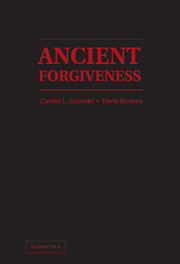Book contents
- Frontmatter
- Contents
- Contributors
- Preface
- Part I The Territory Philosophically Considered
- II Forgiveness Among The Greeks
- Part III Forgiveness Among The Romans
- 5 The Anger of Tyrants and the Forgiveness of Kings
- 6 Gender and Forgiveness in the Early Roman Empire
- 7 “To Forgive Is Divine”
- Part IV Judaic And Christian Forgiveness
- Bibliography of Works Cited
- Index
- References
7 - “To Forgive Is Divine”
Gods as Models of Forgiveness in Late Republican and Early Imperial Rome
from Part III - Forgiveness Among The Romans
Published online by Cambridge University Press: 05 January 2012
- Frontmatter
- Contents
- Contributors
- Preface
- Part I The Territory Philosophically Considered
- II Forgiveness Among The Greeks
- Part III Forgiveness Among The Romans
- 5 The Anger of Tyrants and the Forgiveness of Kings
- 6 Gender and Forgiveness in the Early Roman Empire
- 7 “To Forgive Is Divine”
- Part IV Judaic And Christian Forgiveness
- Bibliography of Works Cited
- Index
- References
Summary
In late republican Rome the question of reconciliation was not only of theoretical import: the city was preoccupied, for decades, by political infighting of the most deadly kind. While there was a wide variety of competing notions concerning what an ideally peaceful Rome should be like, there was, de facto, no feasible prospect for the resolution of the civil war. In the larger mix of difficult, potentially violent altercations, religious arguments and actions had a particular edge. Since the 80s b.c.e., leaders such as Sulla and Pompey exploited religious symbols in order to advance or emphasize their particular powers. Most poignantly, Pompey’s claim to his “greatness,” which obviously sought to mimic that of Alexander the Great, referenced an ideal of divinely sanctioned leadership that challenged the limits of Rome’s traditional structure of government. Of course, no Roman leader would have gone so far as Alexander to claim direct divine parentage and demand religious honors equal to a god for himself, but similar, if less direct, references to divine power became part of the many contested ideals of leadership. The years under Julius Caesar and his adoptive son, Augustus, saw especially intense discussions about the religious status and actions of Roman leaders – exactly at the same time when the resolution of the long civil infighting brought notions of reconciliation into the focus of attention. In this chapter, I examine a few key moments in the process from which the notion of imperial clementia (clemency) emerged – a process that, I argue, included both religious and political concerns.
My main argument engages a nexus of religious, political, and philosophical notions that, I believe, interacted in shaping what we can call, with Adam Morton, the “forgiveness territory” in this period. With reference to other critical concepts of this era, such a multiply influenced process has already been recognized; we know, for example, that the emerging idea of the leader capable of resolving civil conflict was understood, at least in part, through religious language and associations. The salus (well-being) of the state was increasingly seen in connection to that of the commander who could ensure it, and the Salus of that leader was now the subject of prayers. My point is that the idea of imperial clementia also emerged, at least in part, through a religious understanding and that the success of clementia in particular also had to do with its unique characteristics among the specific religious connotations of reconciliation, forgiveness, and clemency in the late republic and early empire.
Information
- Type
- Chapter
- Information
- Ancient ForgivenessClassical, Judaic, and Christian, pp. 115 - 134Publisher: Cambridge University PressPrint publication year: 2011
References
Accessibility standard: Unknown
Why this information is here
This section outlines the accessibility features of this content - including support for screen readers, full keyboard navigation and high-contrast display options. This may not be relevant for you.Accessibility Information
- 1
- Cited by
